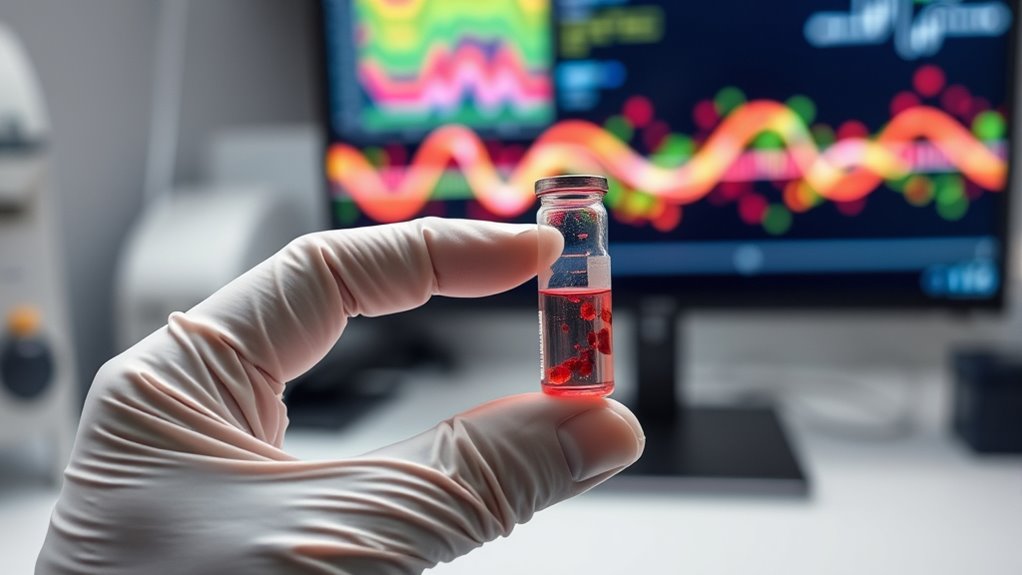Non-invasive prenatal testing (NIPT) uses your blood sample to analyze tiny fetal DNA fragments, giving you a highly accurate way to screen for chromosomal conditions like Down syndrome early in pregnancy. It’s safe, simple, and offers quick results without risking miscarriage, unlike invasive tests. Keep exploring, and you’ll discover how this cutting-edge technology can help you make more informed choices about your baby’s health and your pregnancy journey.
Key Takeaways
- NIPT analyzes fetal DNA fragments in maternal blood to screen for genetic conditions early in pregnancy.
- It uses advanced molecular techniques for accurate detection of chromosomal abnormalities like Down syndrome.
- As a non-invasive test, NIPT offers a safe alternative to invasive procedures, reducing pregnancy risks.
- Results are available within a few days, helping parents make informed decisions and plan ahead.
- NIPT is a screening tool, not a diagnostic test; further testing is needed if abnormalities are indicated.

Have you ever wondered how modern technology helps guarantee your baby’s health before they’re born? Non-invasive prenatal testing (NIPT) uses advanced molecular techniques to analyze your blood sample and screen for potential genetic conditions. When you opt for NIPT, you’re essentially harnessing the power of cutting-edge science to gain early insights into your baby’s health without risking invasive procedures like amniocentesis. This test detects fragments of fetal DNA circulating in your bloodstream, allowing healthcare providers to identify chromosomal abnormalities such as Down syndrome, trisomy 18, and trisomy 13 with remarkable accuracy. The molecular techniques involved focus on isolating and analyzing these tiny DNA fragments, providing clear, reliable results in a matter of days. This process not only offers peace of mind but also helps you make informed decisions about your pregnancy early on. Additionally, understanding molecular techniques can help you better appreciate the precision involved in modern genetic testing.
However, as you consider NIPT, it’s vital to think about the ethical considerations that come with genetic screening. While the technology is highly advanced, it raises questions about how the information will be used, stored, and shared. Some worry that early detection might lead to difficult choices or pressure to terminate pregnancies based on genetic findings. Ensuring that you receive proper counseling is critical so you understand the scope and limitations of the test. Ethical considerations also involve privacy concerns—knowing how your genetic data is protected and who has access to it. It’s fundamental to discuss these issues with your healthcare provider beforehand, so you’re aware of the implications and can make decisions aligned with your values.
NIPT’s non-invasive nature makes it appealing because it eliminates the risks associated with invasive testing methods, but it’s not a diagnostic tool—rather, it’s a screening test. This means that if NIPT indicates a potential issue, further diagnostic testing will be necessary to confirm the results. Still, the combination of molecular techniques and careful interpretation allows for early detection and reassurance, giving you valuable insights without putting your pregnancy at risk. As technology advances, the ethical landscape will continue to evolve, emphasizing the importance of informed consent and respectful communication.
Ultimately, NIPT empowers you with knowledge, helping you prepare for the future and make choices that feel right for you and your family. It’s a remarkable intersection of science and ethics, designed to support your journey into parenthood with clarity and care.
Frequently Asked Questions
Can NIPT Detect All Genetic Disorders in Babies?
No, NIPT can’t detect all genetic disorders in babies. It primarily screens for common genetic mutations linked to conditions like Down syndrome, Edwards syndrome, and Patau syndrome during prenatal screening. While it provides valuable insights, it doesn’t identify every genetic mutation or rare disorder. You should discuss with your healthcare provider about additional testing options if you want a thorough understanding of your baby’s genetic health.
How Early in Pregnancy Can NIPT Be Performed?
Think of your pregnancy as a delicate garden sprouting new life. You can start prenatal screening with NIPT as early as 10 weeks, when fetal DNA begins to circulate in your bloodstream. This testing acts like a vigilant gardener, quietly analyzing this DNA to catch potential issues early. By 10 weeks, you get valuable insights into your baby’s health, giving you peace of mind and a head start on planning.
Is NIPT Recommended for Multiple Pregnancies?
Yes, NIPT is recommended for multiple pregnancies, including twin screening. It provides valuable early insights into the genetic health of each fetus, helping you identify potential issues sooner. Since multiple pregnancies can complicate results, it is crucial to choose a provider experienced in interpreting NIPT for twins. This way, you gain clearer, more accurate information, giving you peace of mind and better preparation for your pregnancy journey.
What Are the Limitations of NIPT Accuracy?
You should know that NIPT’s accuracy has limitations, especially with false positives that can lead to unnecessary worry or follow-up tests. While the test has high sensitivity for detecting certain conditions, it’s not foolproof and can miss some issues, leading to false negatives. Consequently, it’s essential to confirm positive results with diagnostic tests and discuss any concerns with your healthcare provider to make informed decisions.
How Are NIPT Results Communicated to Parents?
Parents typically receive NIPT results through clear communication from their healthcare provider, often during a follow-up appointment. They’re guided by genetic counseling, which helps interpret the results accurately. This process guarantees you understand the significance of the findings, whether positive or negative, and discuss next steps. Expect detailed explanations, supportive answers, and personalized advice, all designed to help you make informed decisions about your baby’s health and future.
Conclusion
By choosing NIPT, you gain peace of mind knowing early insights into your baby’s health. Imagine a mom who discovers a potential chromosomal issue early on and prepares accordingly, thanks to this non-invasive test. NIPT isn’t just about detection; it’s about empowering you to make informed decisions for your little one’s future. With advancements in genetic testing, you can face pregnancy with confidence and clarity, all while keeping your baby safe and healthy.








